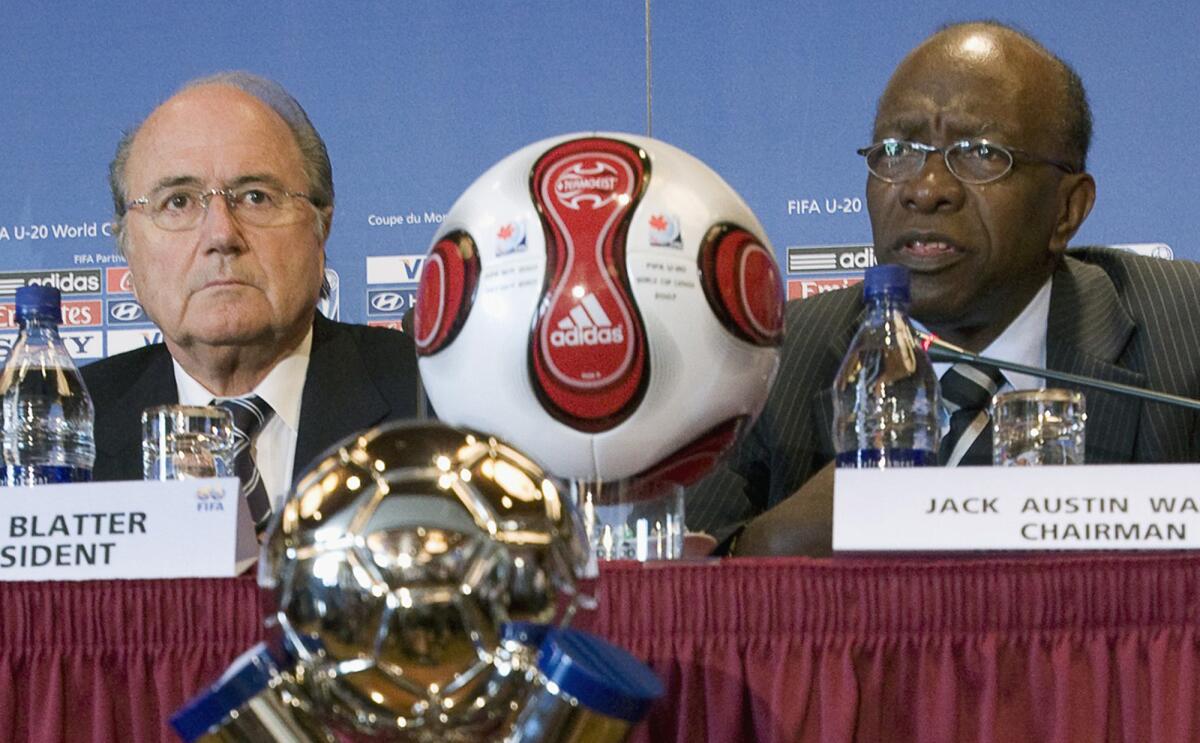Analysis: FIFA ban of Jack Warner may be part of larger strategy

Sepp Blatter, left, and Jack Warner attend a news conference in Toronto on July 20, 2007.
- Share via
FIFA’s campaign to keep President Sepp Blatter in office -- and, presumably, out of jail -- once again caught Jack Warner in its crosshairs Tuesday when world soccer’s governing body banned its former vice president for life.
Warner “committed many and various acts of misconduct continuously and repeatedly during his time as an official in different high-ranking and influential positions at FIFA and CONCACAF,” FIFA said. The ruling by FIFA’s ethics committee stems from its investigation into the bidding process for the 2018 and 2022 World Cup, which Swiss authorities are also probing.
But the timing of FIFA’s indignation over Warner’s actions is interesting because corruption claims against him are nothing new. FIFA itself tried to penalize Warner once before, only to have him quit in an effort to avoid sanction.
This time it’s Blatter who is trying to avoid prosecution.
Last week, the Swiss attorney general’s office announced that it had opened criminal proceedings against Blatter, and a big part of the case centers on a contract Blatter signed with Warner 10 years ago when Blatter was running for reelection as FIFA president.
The deal gave Warner, then president of the Caribbean Football Union, television rights to the 2010 and 2014 World Cups for $600,000, Swiss authorities said. Warner then licensed those rights and resold them for $20 million.
Warner quickly threw his support behind Blatter’s presidential campaign, helping assure his reelection.
Blatter has denied any wrongdoing in the matter.
The decision of FIFA’s ethics committee to hand Warner a lifetime ban at the same time prosecutors are considering legal action against Blatter for questionable dealings with his former ally may be part of a larger strategy to protect world soccer’s highest-ranking official.
Attorneys for FIFA and its embattled president could point to the ban as evidence that the organization has taken the charges made by Swiss authorities seriously and has removed the man responsible for duping the unknowing Blatter.
That strategy may have a few flaws, however.
For starters, Warner’s questionable ethics were already well-known to FIFA, which suspended him as it investigated a bribery scandal in 2011. Warner quit rather than face a possible ban, and FIFA issued a statement at the time in which it said the “presumption of innocence is maintained.”
Warner, 72, was also one of nine high-ranking soccer officials indicted by the U.S. Justice Department last May. A politician in Trinidad and Tobago, he is currently fighting extradition to the U.S. on charges of racketeering, wire fraud and money laundering.
U.S. officials say they believe that Warner was behind a two-decade-long wave of corruption at FIFA and CONCACAF, the ruling body for soccer in North America, Central America and the Caribbean.
In June 2015, a BBC investigation found evidence of bribes paid to Warner, who first joined FIFA’s executive committee in 1983.
On Tuesday, Warner emailed the British Press Assn., saying: “I do not believe however that this will serve as the distraction to FIFA’s present problems as FIFA wishes it to be.
“Given what is happening in Zurich with Blatter I wish to say that there is no such thing as coincidence.”
Meanwhile, Blatter has tried to convey a sense of business as usual, reporting to his Zurich office Tuesday morning as usual as he awaits the Swiss government’s next move.
More to Read
Go beyond the scoreboard
Get the latest on L.A.'s teams in the daily Sports Report newsletter.
You may occasionally receive promotional content from the Los Angeles Times.











